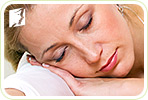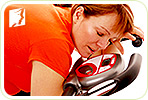Staying physically active is vital to your fitness and overall health no matter what your age. It is especially important however, to remain active when going through menopause. Fluctuations of the female sex hormones estrogen and progesterone are the primary cause of most menopause symptoms. Fatigue and weight gain are common menopause symptoms in women, and can severely affect a woman's daily life and self-confidence. Regaining an active lifestyle during menopause can help prevent menopausal weight gain, as well as provide a myriad of other benefits.
Benefits
Exercising regularly (i.e., at least two and a half hours a week at moderate intensity) has been proven to significantly boost bodily functions and prevent against various ailments and menopausal symptoms.
Increases energy
A recent study conducted by the University of Georgia examined how exercise affects people suffering from constant fatigue. The results of the study showed that the volunteers who exercised at moderate intensity three times a week experienced a 20% increase in energy compared to the control group, who did not exercise at all during the six-week study.
Reduces stress
Regular exercise has also been shown to help reduce stress. Exercising can help release tension built up in muscles, causing your body to relax.
Improves mood
When you exercise, endorphins are released in the brain, which directly improve your mood. Menopausal depression is a common symptom among women, so it is important to remain active in order to prevent and manage it.
Prevents against diseases
Being physically active strengthens your body's immune system, as well as the efficiency of your bones, heart, muscles, and joints. Exercising can help reduce the risk of developing diseases like osteoporosis, obesity, and breast cancer.
Where to Start
When increasing your activity, it is important to start out slow and build up your endurance and strength in order to prevent injury and overexertion.
Grab a friend
Many people find it easier to stay motivated and active if they have a friend to exercise with. Having a workout buddy will motivate you to work out even when you don't want to.
Eat healthy
Exercise is beneficial, but you need to properly fuel your body in order to get the most out of your workouts. If you eat unhealthy foods, you will not have the proper energy for exercising. It is recommended to eat plenty of fruits and vegetables, whole grains, protein, and low-fat dairy every day. Eating three small, balanced meals, as well as healthy snacks throughout the day provides the most energy.
Stay hydrated
This goes hand in hand with the previous step in dealing with what you put into your body. It is important to keep properly hydrated when exercising in order to stay healthy and avoid injury. It is also recommended to cut down on alcohol and caffeine when going through menopause, because they can trigger fatigue and headaches.
Get out there
Now that you know the benefits and building blocks of establishing an active life, get back out there! Low-impact exercises like walking, biking, swimming, and yoga are all excellent forms of exercise that will provide various health benefits. After you build up, try including moderate strength training into your workout routine. Lifting free weights is beneficial for increasing muscle strength and helping to prevent osteoporosis.
Hopefully, these tips will be helpful in regaining your active life during menopause. It is important to take control of your life and remain active in order to stay ahead and prevent menopausal symptoms. It is also important to remember to start out slow and build up when beginning an exercise routine in order to prevent injuries. Stretching before and after any extended physical activity is also recommended. Walking, yoga, and swimming are all excellent forms of exercise that can help with menopausal symptoms.
Sources
- National Health Service UK. (2014). Menopause. Retrieved August 14, 2014, from http://www.nhs.uk/conditions/menopause/pages/introduction.aspx
- National Institute on Aging. (2014). Exercise and Physical Activity: Getting Fit for Life. Retrieved August 14, 2014, from http://www.nia.nih.gov/health/publication/exercise-and-physical-activity
- The Women's Sports Medicine Center. (2002). Exercise Your Way through Menopause. Retrieved August 14, 2014, from http://www.hss.edu/files/Exercise_through_Menopause.pdf




